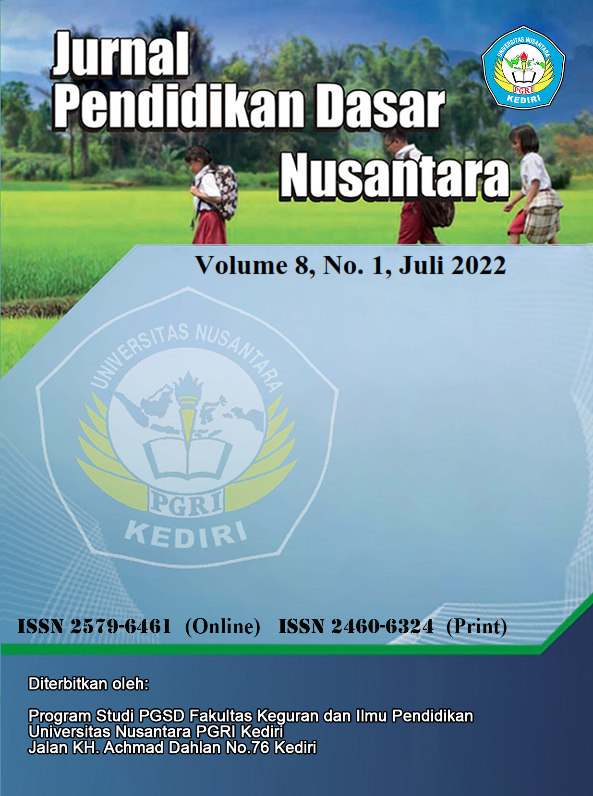THE EFFECT OF DRTA LEARNING MODEL ASSISTED BY COMIC MEDIA ON THE READING COMPREHENSION ABILITY OF STUDENTS CLASS IV PRIMARY SHCOOL
DOI:
https://doi.org/10.29407/jpdn.v8i1.18112Keywords:
DRTA Learning Model; Comic Media; Reading Comprehension Ability.Abstract
This study aims to determine the effect of the Direct Reading Thinking Activity (DRTA) learning model assisted by comics on the reading comprehension ability of fourth grade students at SDN Genuk Ungaran Barat. This study uses a quantitative approach with an experimental method, namely Quasi Experimental Design in the form of a Non-Equivalent Control Group Design. The population in this study were all fourth grade students at SDN Genuk Ungaran Barat. Meanwhile, the samples in this study were fourth grade students at SDN Genuk 01 and fourth grade students at SDN Genuk 02 Ungaran Barat. Data collection techniques used cognitive domain tests, observations, interviews and documentation. The data analysis technique used is the Independent Sample T-Test and Simple Linear Regression Test. The results of this study indicate: (1) There is an average difference in students' reading comprehension skills between the control class and the experimental class, which can be seen from the Independent Sample T-Test and the tcount > ttable (3,611 > 2,008) with a sig. (2-tailed) that is 0.001 < 0.05 then H0 is rejected and Ha is accepted. (2) There is an influence of the Direct Reading Thinking Activity (DRTA) learning model assisted by comics media on students' reading comprehension skills, which can be seen from the Simple Linear Regression Test and obtained a significance level of 0.000 < 0.05 with a percentage value of R2 = 0.573 = 57 ,3%, then this regression model can affect the participation variable. So it can be concluded that the Direct Reading Thinking Activity (DRTA) learning model assisted by comics media affects the reading comprehension ability of fourth grade students at SDN Genuk Ungaran Barat.
Keywords: DRTA Learning Model; Comic Media; Reading Comprehension Ability.
Downloads
References
Al Odwan, T. (2012). The Effect Of The Directed Reading Thinking Activity Through Cooperative Learning On English Secondary Stage Students’ Reading Comprehension in Jordan. International Journal of Humanities and Social Science. 2(16), 138-151.
Bariska, H.F. (2013). Penerapan Strategi Direct Reading Thinking Activity (DRTA) untuk Meningkatkan Keterampilan Membaca Pemahaman Siswa Kelas V. Jurnal Penelitian Pendidikan Guru Sekolah Dasar, 1(2), 1-8.
Daryanto. (2010). Media Pembelajaran. Bandung: Alfabeta.
Dewi, N.P.Y.P., Ganing, N.N., & Abadi, I.G. (2018). Pengaruh Model Pembelajaran Directed Reading Thinking Activity (DRTA) Berbantuan Media Animasi Terhadap Kemampuan Membaca Pemahaman. International Journal of Elementary Education, 2(3), 219-227.
Dwi C, M.D., et al. (2017). The Effect of Comics on EFL Students’ Reading Comprehension at SMPN 1 Bangsalsari Junior High School. EFL Education Journal. 4(2), 891-906.
Habibollahi, A.M., & Behroozizad, S. (2018). Directed reading-thinking activity and reading comprehension. Journal of English Language Pedagogy and Practice, 11(22), 111-126.
Meidyawati, S., Rustono, W.S., & Hodidjah, H. (2018). Pengaruh Penggunaan Media Komik Terhadap Hasil Membaca Pemahaman di Kelas V SDN 2 Gunung Pereng Kota Tasikmalaya. PEDADIDAKTIKA: Jurnal Ilmiah Pendidikan Guru Sekolah Dasar, 5(2), 283-295.
National Center for Education Statistics, PISA 2018 Result. (2018). (Online). (https://nces.ed.gov/surveys/pisa/pisa2018/), Accessed on December 21th 2021.
Purwanti, K.Y., & Putra, L.V. (2019). Keefektifan CIRC Melalui Video Animasi Terhadap Kemampuan Membaca Pemahaman Dengan Motivasi Sebagai Variabel Moderating. JANACITTA. 2(2), 39-45.
Somadayo, Samsu. (2011). Strategi dan Teknik Pembelajaran Membaca. Yogyakarta: Graha Ilmu.
Somadayo, Samsu. (2013). Pengaruh Model Pembelajaran DRTA (Directed Reading Thingking Activity) terhadap Kemampuan Membaca Pemahaman Ditinjau dari Minat Baca. Disertasi. Surakarta: Universitas Sebelas Maret.
Sucitayana, I.M., Putra, I.K.A., & Suardika, I.W.R. (2014). Pengaruh Model DRTA Terhadap Keterampilan Membaca Pemahaman Literal Pada Mata Pelajaran Bahasa Indonesia Siswa Kelas V SD Gugus III Sukawati. MIMBAR PGSD Undiksha, 2(1).
Sugiarti, Uci. (2012). Pentingnya Pembinaan Kegiatan Membaca Sebagai Implikasi Pembelajaran Bahasa Indonesia. Jurnal Basastra, 1(1).
Sugiyono. (2015). Metode Penelitian Pendidikan Kuantitatif, Kualitatif, dan R & D. Bandung: Alfabeta.
Sukestiyarno. (2016). Olah Data Penelitian Berbantuan SPSS. Semarang: Universitas Negeri Semarang.
Suprayitno, Totok. Pendidikan di Indonesia Belajar Dari Hasil PISA 2018. (2019). (Online). (https://litbang.kemdikbud.go.id/pisa), Accested on November 21th 2021.
Tarigan, Henry Guntur. (2015). Membaca sebagai Suatu Keterampilan Berbahasa. Bandung: Penerbit Angkasa Bandung.
Untari, M.F.A., & Saputra, A.A. (2016). Keefektifan media komik terhadap kemampuan membaca pemahaman pada siswa Kelas IV SD. Mimbar Sekolah Dasar, 3(1), 29-39.
Yuliantika, Ni Putu., dkk. (2018). Pengaruh Strategi DRTA terhadap Kemampuan Membaca Pemahaman. Jurnal Pedagogi dan Pembelajaran. 1(3), 170-179.
Zuchdi, Darmiyati. 2004. Strategi Meningkatkan Kemampuan Membaca. Yogyakarta: UNY Press.
Downloads
Published
Issue
Section
License
Authors who publish with this journal agree to the following terms:
- Copyright on any article is retained by the author(s).
- The author grants the journal, the right of first publication with the work simultaneously licensed under a Creative Commons Attribution License that allows others to share the work with an acknowledgment of the work’s authorship and initial publication in this journal.
- Authors are able to enter into separate, additional contractual arrangements for the non-exclusive distribution of the journal’s published version of the work (e.g., post it to an institutional repository or publish it in a book), with an acknowledgment of its initial publication in this journal.
- Authors are permitted and encouraged to post their work online (e.g., in institutional repositories or on their website) prior to and during the submission process, as it can lead to productive exchanges, as well as earlier and greater citation of published work.
- The article and any associated published material is distributed under the Creative Commons Attribution-ShareAlike 4.0 International License
































